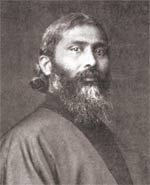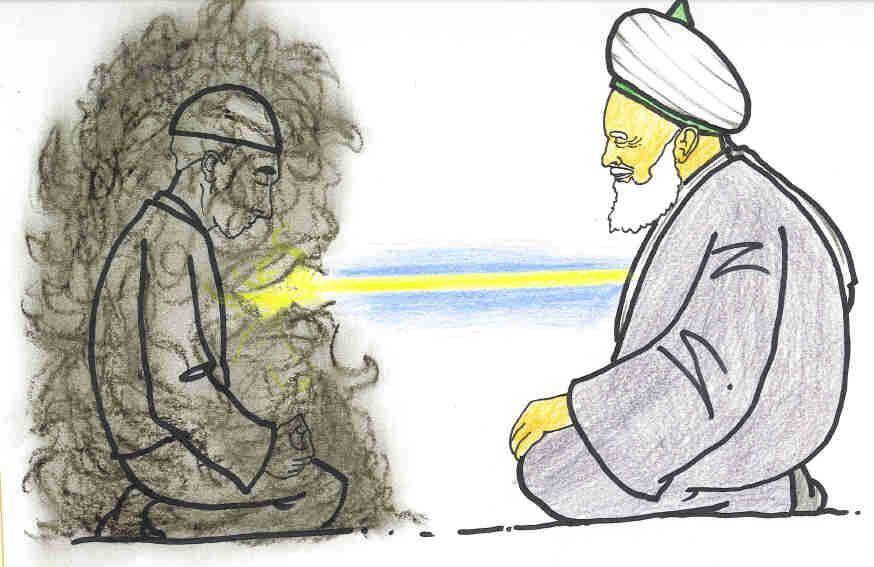 Submitted by SHABDA - Preceptor on
Submitted by SHABDA - Preceptor on

Hazrat Inayat Khan
The Murshid
The Murshid is one who is passive to the word of God from within, who is illuminated, and who holds communion with God. There are two kinds of murshid.
In the first place there is the murshid who receives inspiration in the jungle or in the solitude, and when he arrives at the fullness of the message he comes forth to find a suitable Talib or Mureed, one who is responsive, to whom he can give this message, for the light must find expression. For this light to manifest, no learning is necessary. The most unlettered have been the greatest teachers in the world.
One notable example is Kabir, the weaver who wrote volumes of inspired verse. His poems were in the language of an illiterate man, but in spite of this they have been read and admired all over India, and Kabir is looked upon as one of the greatest and most enlightened teachers.
This class of murshid therefore gathers round him mureeds who are responsive, and who will make themselves passive to receive his training. This is difficult for some people who say that they cannot give up their individuality to another. But when we consider this question, we may ask ourselves, "Who is another?" Then we realize that in the true sense of being there is but one. When the veil of ignorance is raised there is no longer any "I" and "you", but only the One exists. This is the teaching of the Bible and of all scriptures. The murshid and the mureed are one.
The other murshids are Khalifs, those who belonged to a special school such as the Chisti, Qadiri, Naqshibandi, Suhrawardi, and who base their training on a careful and special observation of human beings, and their character and tendencies. They teach exactly the same truth as the other class of Sufi, but they follow a method adapted to suit the faith, belief nature, and manner of the people who come under their care.
The system is only the outer garment, the coat as it were. Many people claim to know all about Sufism from simply reading about it in books, but what such people know is in reality only the system, the outer garment, not the inner truth.
- Some people who see Sufism taught by a Muslim, preaching in the mosque, naturally call it a branch of Islam; but they do not know that the seed which is found in the fruit was in its origin the root of that same plant.
- Those who see it in the garb of Hinduism, say it is derived from Hinduism.
- Those who see its resemblance to Buddhism, say that its origin is Buddhism.
- Now the message of Sufism is being proclaimed in the West where the people are mostly Christian, and as it is given to suit the faith, belief, customs, and manners of the inhabitants, a person who does not know the real idea of Sufism may say that this is a new sect of Christianity.
Let people call it what they will; Sufism being the essence of all religion, it matters little what faith people profess, provided they understand rightly.
In the East there are many such schools. There is a great spiritual advantage in being initiated into one of them, as the initiate has the help, not only of his murshid, but of all the former murshids who have passed over to the other side. He is, in fact, as a link in a chain. The murshid is like a gardener who knows all the flowers, plants, and fruits in his garden, and carefully tends them. In like manner the murshid tends all those who have entrusted themselves to his guidance.
The murshid is also like a physician. He prescribes to each mureed medicine suited to his needs. The same medicine could not be given to all.
A true murshid is looked upon as a bridge to unite his mureeds with their Lord. He is, as it were, the gatekeeper of the king's palace, and he can guide only to the inner door which leads to the presence chamber. The murshid is far greater than an earthly sovereign, for by his glance or his word he can change the life of another who comes to him in faith, for his kingdom is the Kingdom of Heaven, which has its domain over all the kingdoms of the earth.
Hafiz says, "Do not mistake the ragged sleeves of the dervish, for under those sleeves that are full of patches, most powerful arms are hid."
The murshid desires all earthly as well as heavenly blessings for his mureeds; but he can do but little where there is no response and faith. The murshid sets far greater stress on the life of his mureed than on the punctuality of his meditation. He teaches that it is of far greater importance to cultivate in one's life attributes such as kindness, gentleness, and love. It is when the mureed fails in this that the murshid is unable to inspire him, for the mureed is standing in his own light.
A story is told of a mureed who had been under the guidance of a murshid for some years, and had not yet attained his goal. He had seen many come and depart inspired. In the end he went to the murshid, and asked why this was so. The murshid said in answer, "My son, the fault is not with me, but in thyself." A mad dog was passing at the time, and the murshid glanced at it, and the dog was cured instantly of its madness. He then pointed out that it was not lack of power on the part of the murshid, but lack of response on the part of the mureed.
About this, Hafiz says, "The dark-fated ones cannot be guided even by the illuminated ones."

- 2528 reads